Is your garden full of pumpkins, but you’re not sure why so many animals seem to be eating away at them in the night? Don’t worry—you’re not alone! While it may feel like a mystery and an unwelcome problem for those with gardens or large pumpkin patches, several familiar species are likely responsible. Uncovering the cause of crop damage due to pumpkin-munching creatures is something that all gardeners should know about. In this blog post, we’ll look into why pumpkins are so attractive to these nocturnal critters, as well as discuss preventative measures to keep them away from your precious plants. Let’s dive right in and learn more about who is snacking on pumpkins under the cover of darkness!
Is It Difficult to Grow Pumpkins?
Growing pumpkins is not difficult! In fact, it’s actually quite easy. All you need is some space in your yard or garden, good soil, and plenty of sunlight.
Pumpkins are a warm-season crop that do best when sown directly into the soil after all danger of frost has passed.
Water regularly to keep the soil moist but not wet. Fertilize during the growing season for bigger fruit yields. Harvest pumpkins when their skin turns orange and give them a good shake to make sure they’re ripe before picking them from the vine. With proper care, you’ll be able to enjoy a bountiful harvest of pumpkins in no time! [2]
Is It Necessary to Fertilize Pumpkins?
Fertilizing pumpkins is important for good growth and production. However, it is not always necessary to fertilize your pumpkin plants. If the soil in which you’ve planted them already contains sufficient amounts of nutrients (like nitrogen, potassium, and phosphorus) then you won’t need to add any additional fertilizer. If your soil appears nutrient-poor or if the plants are particularly low in vigor, then an extra boost of fertility may be beneficial to support overall plant health. [3]
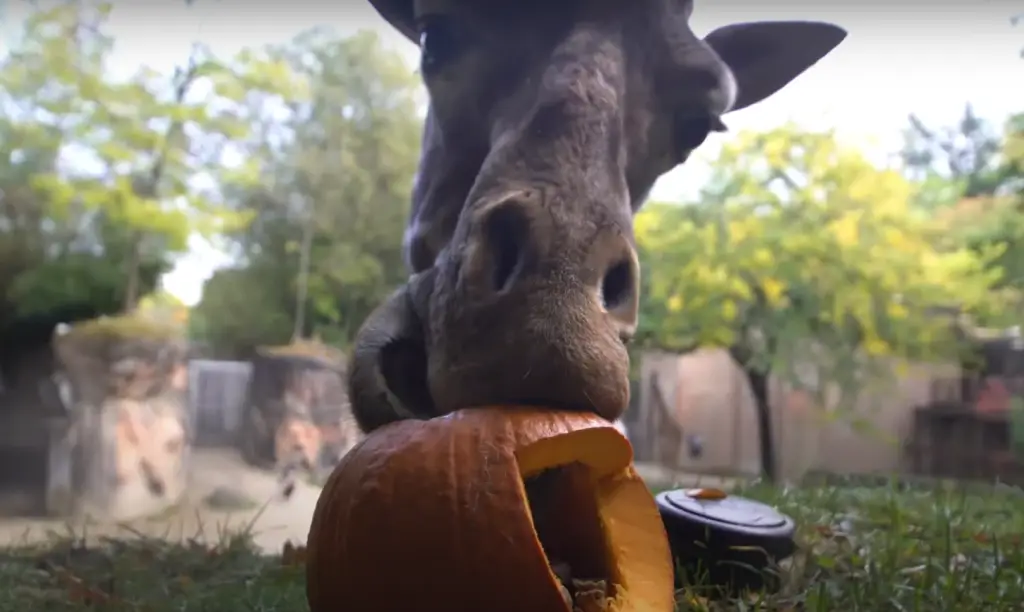
The type of fertilizer used should be based on a soil test as different soils contain different levels of essential elements that the plant needs for optimal growth and fruit production. In general, a balanced fertilizer with an equal ratio of nitrogen (N), phosphorus (P), and potassium (K) is recommended. It should be applied at the start of the growing season so the plants have enough nutrition to produce healthy foliage and fruits throughout their life cycle.
If you opt to fertilize your pumpkin plants, do not overdo it as too much fertilizer can burn the roots of your plants and potentially kill them. Additionally, take care to avoid getting fertilizer on young vines, leaves, or fruits as this may cause damage. Rather than applying straight fertilizer, many gardeners prefer to use organic amendments such as blood meal and composted manure which are generally a bit gentler for young plants and also help improve soil structure. [4]
Which Animals Prefer Pumpkin Seeds and Which Prefer Plants Itself?
Pumpkin seeds are a favorite snack for many small animals such as squirrels, chipmunks, raccoons, and birds. Larger mammals such as deer may also enjoy the occasional pumpkin seed. Pumpkin plants themselves are more attractive to animals like goats, rabbits, and some rodents. These animals prefer grazing on the entire plant itself rather than just the seeds. If you see evidence of animal activity around your pumpkins, it is likely that one of these species is in your area!
It’s important to keep in mind that both types of food can be dangerous if eaten by certain animals or consumed in excess amounts. For instance, some wild rabbits have been known to eat too much pumpkin and suffer from digestive issues such as diarrhea or bloating. Additionally, pumpkin seeds can be choking hazards for small animals like birds if they are not adequately chewed and digested before being swallowed. With these considerations in mind, it’s best to monitor the amount of pumpkin-based snacks that you provide your wild animal friends!
If you decide to plant pumpkins for wildlife in your area, make sure to use only organic methods that will not harm the environment or local animal populations.
Ultimately, offering either pumpkin seeds or entire plants can help promote healthy habitats for both animals and humans alike! [5]Why Do Animals Love Pumpkins So Much?
The taste and texture of the pumpkin is appealing to most animals. In addition, pumpkins contain several beneficial vitamins and minerals that can help support overall health for your pet. When feeding your pets pumpkin, it’s important to remember that moderation is key. Too much pumpkin may cause an upset stomach or diarrhea in some animals.
Pumpkin also contains high levels of dietary fiber which helps keep stool regular. This makes it a great supplement for cats and dogs who suffer from constipation or have difficulty digesting their food properly. Additionally, the natural enzymes found in pumpkins can help with digestion issues as well.
Finally, animals often enjoy the smell and taste of pumpkins. This can be a great way to get your pet excited about mealtime or just give them a special treat. Even rabbits, guinea pigs, and other small animals can benefit from adding a bit of pumpkin to their diets.
Overall, feeding your pet pumpkin in moderation is an easy and safe way to provide some extra nutrition as well as something fun for them to eat! [6]
What Animals Eat Pumpkins From the Garden?
Most animals tend to prefer ripe or overripe pumpkins as opposed to green ones. If you have a pumpkin patch in your garden that has been invaded by pests or wildlife looking for an easy meal then make sure to check it regularly so you can pick any ripe fruits before they get snacked on!
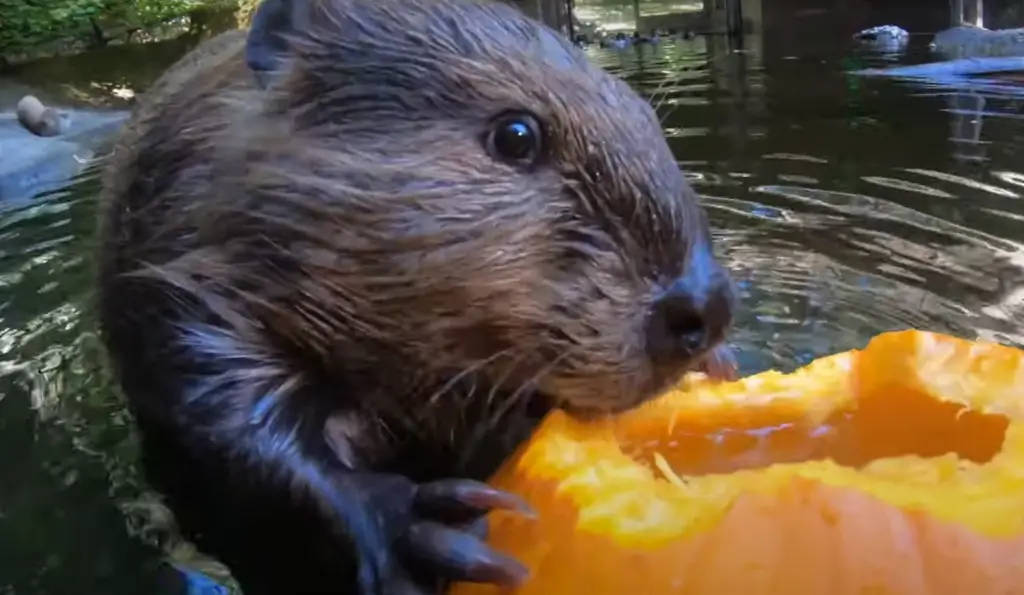
Aside from eating them directly from the vine (or ground if they’ve already fallen), animals may also pick off large pieces of pumpkin flesh and take it somewhere else to enjoy. So if you notice any missing chunks from your pumpkins, don’t worry – it’s just a sign that you have some hungry critters around!
Pumpkins can also be an important source of nutrition for wild animals during the winter months when other food sources are scarcer.
Some of the most popular animals that like to eat pumpkin at night include chipmunks, deers, squirrels, birds, rabbits, chickens, cows, ground moles, mice. [7]
Chipmunks
Chipmunks are mostly nocturnal animals, meaning they prefer to forage for food and explore the world during the night when it’s quieter. As omnivorous creatures, chipmunks will take whatever food sources they can find in their environment – and this may include pumpkins from your garden!
Chipmunks don’t have large teeth like rodents do, so they often need to chew on softer foods like fruits or vegetables. Pumpkins make a great snack as they contain plenty of fiber, vitamin A and other nutrients that help keep them healthy throughout the winter.
So if you catch a few chipmunks snacking on your pumpkins at night then don’t be alarmed – just ensure that you’re harvesting the ripe fruits before they get a chance to!
Deers
Deers are foraging animals, so they’re always on the lookout for something to eat. Pumpkins are high in sugar and provide an easy-to-access source of nutrition. Plus, since pumpkins have a thick skin protecting them against predation, deers won’t need to worry about being attacked while they munch away at your crops at night!
It should be noted that if your garden is frequented by deer then you may want to consider installing some fencing around it as a precautionary measure. This will ensure that any vulnerable plants or vegetables don’t get damaged.
Fortunately, most deer don’t tend to stay long and usually move on after consuming their fill from your pumpkin patch.
Squirrels
Squirrels are one of the most common animals to feast on pumpkins at night. They prefer pumpkins that have fallen from the vine because they’re easier to access. This is also why you often find them getting into your compost pile or bird feeders!
For squirrels, eating pumpkin is a way for them to get some additional vitamins and minerals that they may not be able to find in other food sources, especially during colder months when their normal foods may no longer be available.
Birds
Birds typically visit pumpkin patches at night because it is cooler and less likely that they will be noticed by predators. Additionally, the strong aroma of pumpkins can be attractive to birds, as many species have a keen sense of smell. Some birds may also use pieces of pumpkin for nesting materials or insulation in their nests. Pumpkin seeds are also rich in calcium and other essential nutrients which offer a wide variety of benefits for birds.
Rabbits
Rabbits are nocturnal creatures, so they’re most active in the evening and at night. As such, they may be attracted to the orange glow of a pumpkin if it’s visible in the dark. Additionally, many rabbits have a sweet tooth for pumpkins and other fruits, which is why they often go out of their way to find them! If you notice any nibbled pieces of pumpkin around your property, then chances are a rabbit is responsible.
Chickens
Chickens will eat pumpkins at night as a way to help them stay warm in cold temperatures. Pumpkins provide chickens with important vitamin A and other vital nutrition, which helps to keep their bodies in balance. Eating pumpkin also provides chickens with extra energy, which can be useful when they need additional warmth on cold nights. Additionally, the seeds of the pumpkin are high in fiber content and make a great snack for chickens. Finally, eating pumpkin at night gives chickens something to do while they roost instead of just sitting around all night long!
Cow
Cow has four stomachs, and when they are eating pumpkins at night it goes through their digestive tract faster and helps with digestion. The pumpkins provide them a source of carbohydrates which is important for energy production and keeping them healthy. Additionally, the pumpkin shells can help to wear down any sharp edges on a cow’s teeth, helping to keep their mouths healthy and free from cavities.
Ground Moles
Ground moles love to eat pumpkins at night because of the high nutrient content that they contain.
The ideal time for ground moles to feast on a pumpkin is when it has ripened fully and begun to rot slightly since this will increase its nutritional value even more. It’s important to remember though that if your garden is home to any other animals such as rabbits or deer then you may want to exclude them from eating your pumpkins as these species can carry diseases which can be transmitted onto humans.Mice
Mice can be active during the night when it’s dark and quiet. Although pumpkin is not their preferred food source, mice do enjoy eating pumpkin as a snack or meal during peak hours of darkness. Pumpkin offers plenty of nutrition such as carbohydrates, fiber and vitamins, so it can help sustain a mouse’s energy levels throughout the night.
In addition to providing sustenance, mice may also use pumpkin as shelter or hideaway from predators. Small pieces of pumpkin flesh may create enough cover for them to scurry away unnoticed if need be.
10 Effective Methods of Keeping Animals And Pests Away from Your Pumpkins
These measures should help you protect your pumpkins from animals, as well as many other pests.
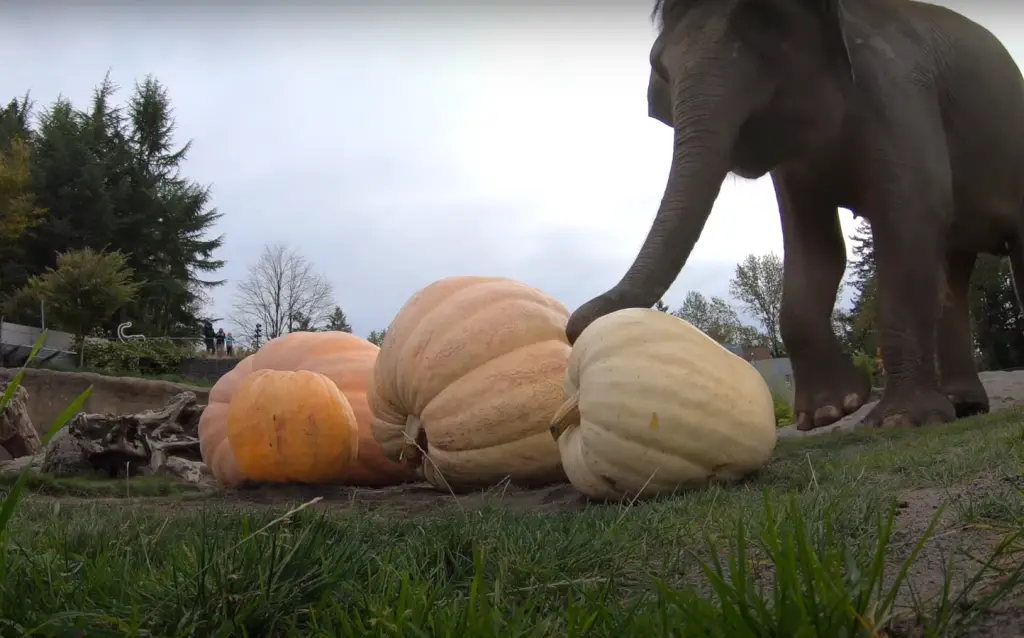
However, if you’re still having trouble with critters eating your pumpkins, contact an exterminator to get rid of the pests for good.
- Plant marigolds, garlic and onions near your pumpkin patch as these plants deter animals from venturing too close.
- Install a fence around your pumpkin patch to keep out larger animals like deer or rabbits.
- Place critter guards over small pumpkins to protect them from being eaten by rodents and other pests.
- Put up scarecrows or plastic owls in the area to frighten away birds and smaller mammals looking for an easy meal.
- Use netting over your plants if you’re having trouble with large numbers of insects eating the leaves and flowers of your pumpkins.
- Sprinkle cayenne pepper or dried blood on the soil around your pumpkins to keep animals away.
- Keep mulch away from the base of your plants as it can attract small rodents and other pests looking for shelter.
- Use reflective ornaments such as CDs hung in trees to scare away birds.
- Hang sugary fruit, like apples or bananas, on a tree near the edge of your garden to entice animals farther away from the pumpkin patch.
- Connect motion sensor sprinklers around your yard that will startle any animal that gets too close to your pumpkin plants with a sudden spray of water. [8]
FAQs
What animals can eat a whole pumpkin?
Cows, goats, horses, pigs and sheep can all consume a whole pumpkin. Chickens, ducks and geese will also eat pumpkins but cannot digest the hard rind of the fruit.
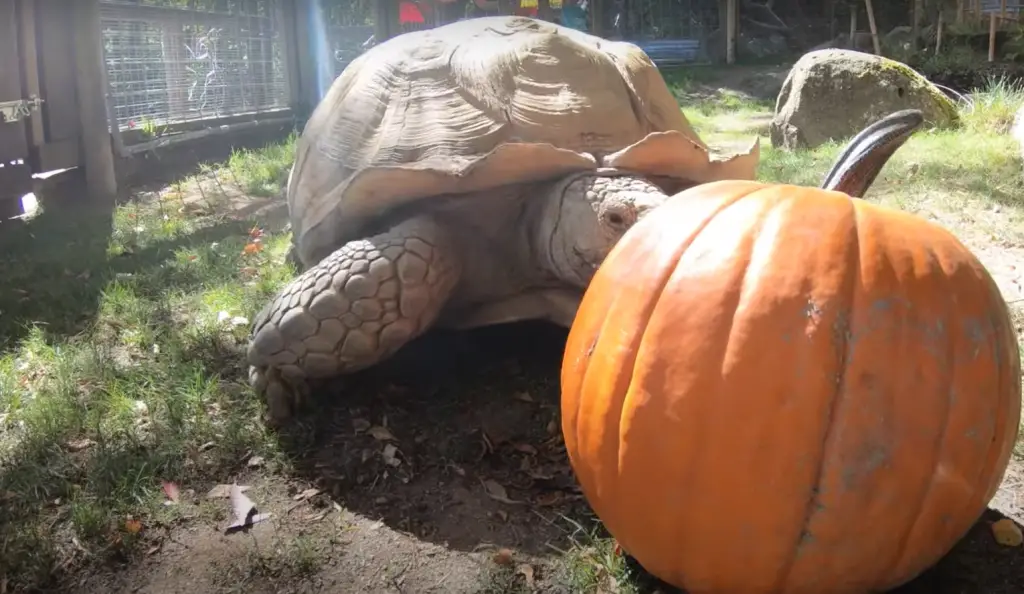
It is important to note that some animals may be allergic or sensitive to certain foods and should not be fed pumpkins without first consulting with a veterinarian. Additionally, feeding large amounts of pumpkins to any animal can cause digestive upset. Therefore it is best to feed these fruits in moderation.
Do foxes eat pumpkin?
Foxes are omnivorous, so yes, they can eat pumpkins. In the wild, foxes typically consume small prey such as mice and birds, but they will also forage for fruits and vegetables when available. Pumpkins have a high nutritional value for animals, including vitamins A and C, fiber, and carbohydrates. Foxes may hunt or scavenge for pumpkin flesh or seeds; however, pumpkins can be dangerous to animals if not eaten in moderation due to their high sugar content.
Is pumpkin good for all animals?
The answer to this question depends on the animal in question. Pumpkin is generally considered safe for most animals, including dogs, cats, horses, and cows. However, it is important to note that pumpkin should only be given in moderation to any animal. Too much pumpkin can lead to gastrointestinal upset or diarrhea. Additionally, some animals may not tolerate pumpkin well at all and could have an allergic reaction if fed too much of the vegetable.
Why do cats like pumpkin?
Cats have an instinctive attraction to pumpkin and its related squash varieties. For cats, the strong smell of pumpkins can be irresistible due to their powerful scent receptors, which are approximately 40 times more potent than ours.
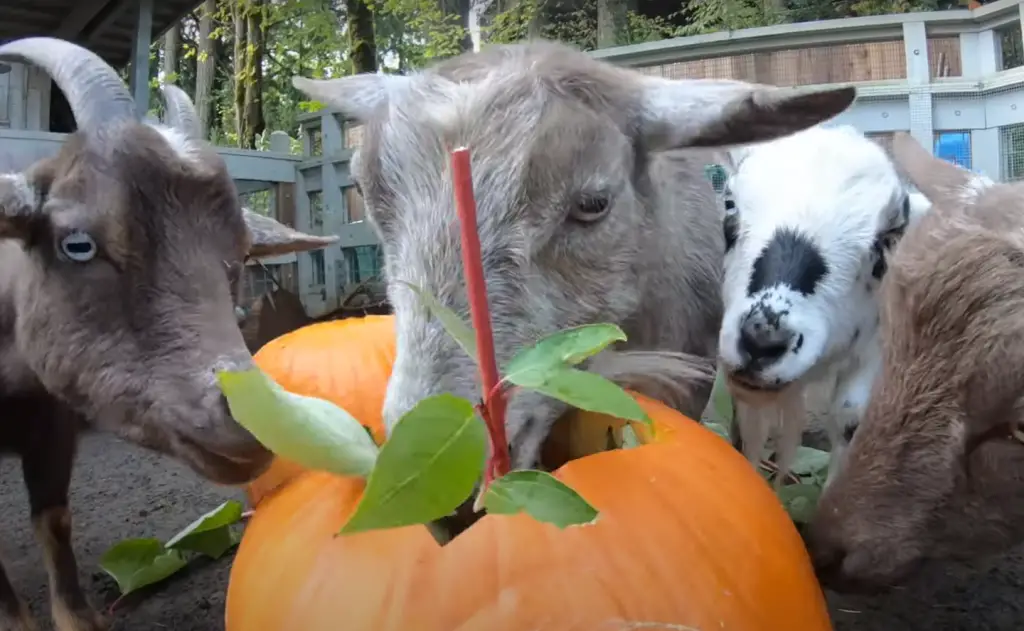
It’s believed that cats may use this heightened sense of smell to detect nutrients in certain foods like pumpkin as it has a high concentration of Vitamin A and other important minerals. Additionally, the smell is comforting and familiar to cats, giving them reassurance as they explore new smells and tastes in their environment. All these benefits make pumpkin a great food for cats.
Useful Video: Hippos and Painted Dogs get Pumpkins to Kickoff HallZooween – Cincinnati Zoo
Conclusion
With their scrumptious and versatile flavor, pumpkins are sure to be the treat of the season for your favorite animal friends. Not only are pumpkin treats a fun way to bond with your furry friends, but they can also offer a variety of health benefits that may be attractive to pet owners. Pumpkins have many nutritional benefits including being low in calories and high in fiber, as well as providing many essential vitamins and minerals. These advantages make them an ideal night snack for critters excited to start their nighttime adventures! All-in-all, whether it’s Halloween or any time of year, consider taking advantage of this gourd’s exceptional health benefits by sharing some delicious pumpkin treats with your helpful nocturnal mammals.
References:
- https://www.rhs.org.uk/vegetables/pumpkins/grow-your-own
- https://www.gardeners.com/how-to/growing-pumpkins/8585.html
- https://www.pumpkinlicious.com/when-to-fertilize-pumpkins.html
- https://www.gardeningknowhow.com/edible/vegetables/pumpkin/feeding-pumpkin-plants.htm
- https://pestpointers.com/animals-that-love-eating-your-pumpkins-how-to-repel-them/
- https://awesomewildlifeco.co.uk/blogs/blog/are-pumpkins-safe-for-wildlife-to-eat
- https://gardeninghood.com/what-animals-eat-pumpkins-10-ways-to-keep-away/
- https://www.growgardener.com/how-to-protect-growing-pumpkins-from-animals/





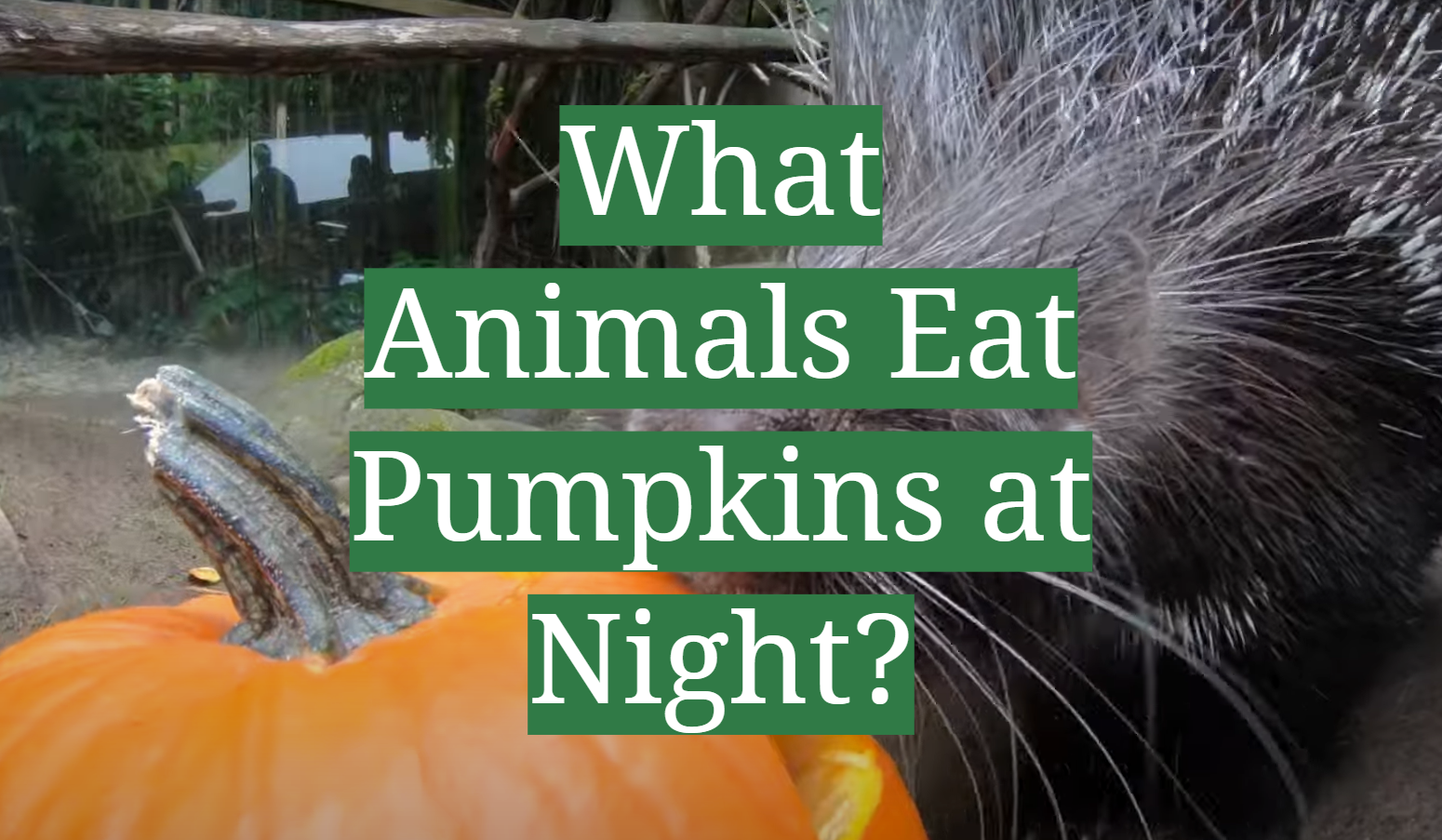

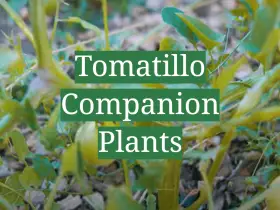

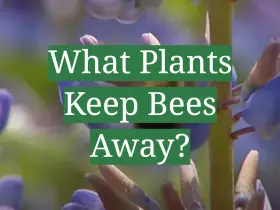
Leave a Reply
View Comments